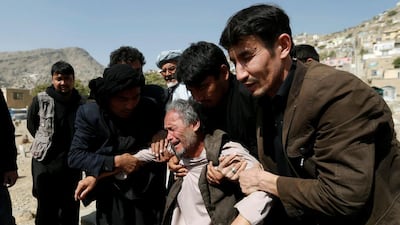KABUL // Grieving worshippers on Wednesday described desperately trying to shelter their children against a hail of gunfire in Kabul that killed at least 18 people gathering to mark Ashura, one of the most important festivals of the Shiite calendar.
Officials said they were still confirming casualties as witnesses described gunmen firing “indiscriminately” on men, women and children as they tried to flee.
Late Tuesday gunmen entered the Karte Sakhi shrine near Kabul University, sparking a two-hour long siege as they exchanged fire with Afghan security forces.
At least 18 civilians were killed and 50 wounded, the United Nations said. Some witnesses said the toll could be higher.
Among the dead were four women and two children, according to the UN, which condemned the attack as an “atrocity”.
One mother who gave her name as Saleha said a gunman was “killing everyone”.
She was shot in the leg as she tried to protect her child. “While I was hugging my little son I begged him not to kill my child,” she said.
The child survived, but she angrily denounced the Afghan government for failing to protect them.
“The families of the president, CEO Dr Abdullah and other rich ones live abroad. Here, only poor people are killed every day.”
Another witness, Ali Hussain, said attackers wearing military uniforms first shot the police guard at the gate and then entered the shrine, where dozens of worshippers had gathered.
“They indiscriminately shot everyone they faced. They wouldn’t even spare women and children,” said Hussain, who fled through a library back door.
Mourners buried at least one of the victims, a four-year-old girl, on Wednesday morning.
“Last night was a doomsday for us,” said Mohammed Hussain, one of the girl’s relatives.
There were conflicting reports about the number of attackers and attacks on Tuesday, with interior ministry spokesman Sediq Sediqqi saying Wednesday there had been two attacks in two different Kabul locations.
“There were two attacks last night in which two terrorists were involved. We are still trying to finalise casualties report,” he said, without providing further details.
The health ministry said at least 44 wounded people were taken to various hospitals in Kabul.
The Taliban said they were not involved and no group has yet officially claimed responsibility for what president Ashraf Ghani condemned as a “clear sign of a crime against humanity”.
The threat of attack targeting Shiites was considered particularly serious during Ashura, and many foreign embassies in Kabul had restricted their staff’s movements until the end of the week.
Ashura commemorates the death of Imam Hussein, grandson of the Prophet Muhammad, who was assassinated in 680 and whose tragic end laid the foundation for the faith practised by the Shiite community.
Commemorations for the holy day of Ashura in the Afghan capital, Kabul, were subdued on Wednesday amid security fears.
The last attack on Afghanistan’s Shiite minority, on July 23 in Kabul, killed 84 people and left 130 injured. It was claimed by the ISIL organisation.
In 2011, about 80 people were killed and more than 100 were wounded when a suicide bomber struck a gathering of Shiites during Ashura in the heart of Kabul.
* Agence France-Presse and Reuters

